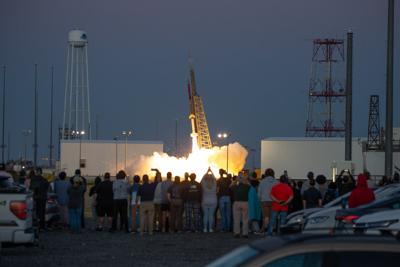WALLOPS ISLAND, VA - Wallops launched its very first rocket 80 years ago to the day today. On June 27, 1945, that first launch sparked a decades-long legacy of spectacular and breathtaking missions that would establish the facility as a keystone draw for tourism and talent on Virginia’s Eastern Shore. Their latest launch was just completed Thursday.
Wallops' 80-year milestone, however, comes at a time of turbulence and uncertainty at the National Aeronautics and Space Administration.
As WBOC previously reported, the Trump Administration's proposed budget for FY2026 would reduce NASA’s total budget by nearly 25%. That reduction, according to the proposed budget, would include a 50% cut to the sounding rocket program, the elimination of the balloon program, and a 32% workforce reduction.
NASA TOWN HALL
At a NASA-wide Town Hall, held on Wednesday, June 25, agency leaders gathered to provide the latest on anticipated budget slashes and restructuring.
WBOC has obtained an audio recording of that meeting, verified by a current NASA employee.
“I want to express how much I know you are balancing right now, and I'm really grateful, again, that you've made time to join this conversation,” NASA Acting Administrator Janet Petro said during Wednesday’s meeting. “I know these past few months have brought a lot of change, much of it unexpected, and I'm a first hand witness to all of that.”
Joined by several other prominent NASA leaders at the Town Hall, Petro confirmed the agency was already taking steps to downsize, even before the proposed budget’s adoption by Congress. Officials pointed to repeated years of budget decreases as the reason.
“It’s not about being responsive to the President’s budget or waiting and hoping for Congress to do something different,” Chief of Staff Brian Hughes said. “It’s about seeing a trend and keeping on the same path.”
Regardless of the reason behind the cuts, NASA's reduction has drawn the ire and worry of numerous current employees, including those here on Delmarva.
DEFERRED RESIGNATION PROGRAM
NASA says it is currently offering a Deferred Resignation Program, or DRP, to employees, allowing them to go on paid administrative leave through January. According to NASA Deputy Associate Administrator Casey Swails, 1,500 employees agency-wide have opted into the program so far.
Numerous current and former NASA Wallops employees, requesting anonymity, have reached out to WBOC to express their concerns and frustrations with the reductions and deferments.
One current employee tells WBOC that at least two dozen Wallops employees have taken the DRP option already.
“Please know, the reason we are doing this is to minimize any involuntary workforce reductions in the future,” Petro said on Wednesday. “That is our whole goal, minimizing that, if not eliminating, any involuntary in the future. And I want to say, for those of you who are departing, we honor your service and the many contributions that you've made to this agency over the years.”
NASA employees have until July 25 to decide whether or not to participate in the DRP or risk involuntary layoffs in the future, according to NASA leadership.
CONTRACTORS
Federal employees are not the only ones impacted by the proposed cuts. In fact, according to Petro, NASA’s contractors will be the heaviest hit by budgetary reductions.
“85% of our budget goes out the door to contractors,” Petro said at this week’s town hall. “So with a reduced budget, absolutely our contractors will also be impacted. In fact, they're probably the bigger driver that will be impacted.”
NASA Wallops relies on numerous contract workers, and a former NASA employee claims Work Adjustment and Retraining Notifications (WARN) notices have already been issued to some of those contractors at Wallops Flight Facility. No public WARN notices for those contractors are currently listed on Virginia’s labor website.
FRUSTRATIONS CONTINUE
NASA employees tell us they are further frustrated by what they call an inability to publicly advocate against the proposed budget cuts, as well as the agency itself not resisting the proposals. According to NASA leadership, it is not the agency’s place to do so.
“We as an agency, we are a part of the executive branch and we support the president's budget, so we're not advocating for any changes,” Deputy Associate Administrator Swails said.
Accomack County Supervisor Jeff Parks, who sits on the Wallops Research Park Leadership Council, hopes to give a public voice to Wallops employees’ concerns.
"There's a lot of cutting going on at a lot of agencies,” Parks said in an interview with WBOC. “But I do feel like NASA is suffering pretty heavily and we're hoping that that's going to change and we're certainly lobbying our representatives to do what we can to be heard that this has a huge impact on our local citizens, our local economy."
Virginia’s U.S. Senator Tim Kaine also sent the following statement to WBOC:
“The Trump Administration’s continued efforts to slash the federal workforce and force federal employees to leave their roles are ridiculous. I will continue to do everything I can in the U.S. Senate to protect our nonpartisan civil service, including at NASA Wallops, which plays such an important role in our country’s space program and in the Eastern Shore’s economy.”
The Trump Administration’s proposed budget passed the House in May and is currently under consideration in the Senate.
Public affairs officials with NASA Wallops Flight Facility did not respond to WBOC’s requests for comment on this story. WBOC also reached out to State Rep. Jen Kiggans, who represents Accomack County, but did not receive an immediate response.


